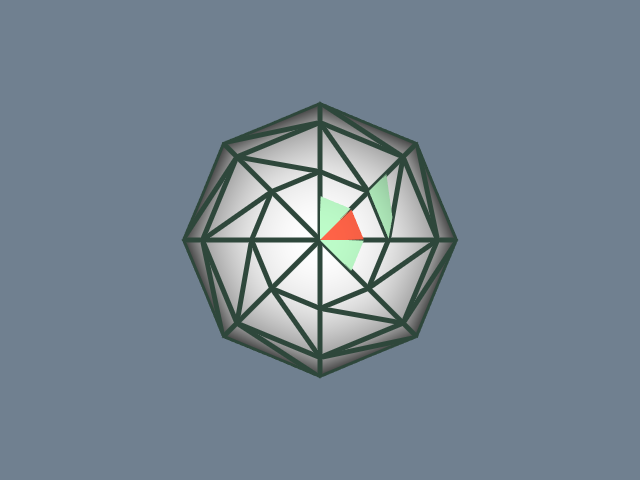CellEdgeNeighbors
Repository source: CellEdgeNeighbors
Description¶
Determine which cells share an edge with a specified cell.
Question
If you have a question about this example, please use the VTK Discourse Forum
Code¶
CellEdgeNeighbors.cxx
#include <vtkActor.h>
#include <vtkDataSetMapper.h>
#include <vtkExtractSelection.h>
#include <vtkIdList.h>
#include <vtkIdTypeArray.h>
#include <vtkNamedColors.h>
#include <vtkNew.h>
#include <vtkProperty.h>
#include <vtkRenderWindow.h>
#include <vtkRenderWindowInteractor.h>
#include <vtkRenderer.h>
#include <vtkSelection.h>
#include <vtkSelectionNode.h>
#include <vtkSphereSource.h>
#include <vtkTriangleFilter.h>
#include <iostream>
#include <list>
int main(int, char*[])
{
// Create a sphere.
vtkNew<vtkSphereSource> sphereSource;
sphereSource->Update();
vtkNew<vtkTriangleFilter> triangleFilter;
triangleFilter->SetInputConnection(sphereSource->GetOutputPort());
triangleFilter->Update();
vtkIdType cellId = 0;
vtkNew<vtkIdList> cellPointIds;
triangleFilter->GetOutput()->GetCellPoints(cellId, cellPointIds);
std::list<vtkIdType> neighbors;
for (vtkIdType i = 0; i < cellPointIds->GetNumberOfIds(); i++)
{
vtkNew<vtkIdList> idList;
// Add one of the edge points.
idList->InsertNextId(cellPointIds->GetId(i));
// Add the other edge point
if (i + 1 == cellPointIds->GetNumberOfIds())
{
idList->InsertNextId(cellPointIds->GetId(0));
}
else
{
idList->InsertNextId(cellPointIds->GetId(i + 1));
}
// Get the neighbors of the cell.
vtkNew<vtkIdList> neighborCellIds;
triangleFilter->GetOutput()->GetCellNeighbors(cellId, idList,
neighborCellIds);
for (vtkIdType j = 0; j < neighborCellIds->GetNumberOfIds(); j++)
{
neighbors.push_back(neighborCellIds->GetId(j));
}
}
std::cout << "Edge neighbor ids are: " << std::endl;
for (auto it1 = neighbors.begin(); it1 != neighbors.end(); ++it1)
{
std::cout << " " << *it1;
}
std::cout << std::endl;
vtkNew<vtkNamedColors> colors;
vtkNew<vtkDataSetMapper> sphereMapper;
sphereMapper->SetInputConnection(sphereSource->GetOutputPort());
sphereMapper->SetResolveCoincidentTopologyToPolygonOffset();
vtkNew<vtkActor> sphereActor;
sphereActor->SetMapper(sphereMapper);
sphereActor->GetProperty()->SetEdgeColor(
colors->GetColor3d("Lamp_Black").GetData());
sphereActor->GetProperty()->EdgeVisibilityOn();
sphereActor->GetProperty()->SetLineWidth(5);
vtkNew<vtkDataSetMapper> mainCellMapper;
vtkNew<vtkDataSetMapper> neighborCellsMapper;
// Create a dataset with the cell of interest.
{
vtkNew<vtkIdTypeArray> ids;
ids->SetNumberOfComponents(1);
ids->InsertNextValue(cellId);
vtkNew<vtkSelectionNode> selectionNode;
selectionNode->SetFieldType(vtkSelectionNode::CELL);
selectionNode->SetContentType(vtkSelectionNode::INDICES);
selectionNode->SetSelectionList(ids);
vtkNew<vtkSelection> selection;
selection->AddNode(selectionNode);
vtkNew<vtkExtractSelection> extractSelection;
extractSelection->SetInputConnection(0, sphereSource->GetOutputPort());
extractSelection->SetInputData(1, selection);
extractSelection->Update();
mainCellMapper->SetInputConnection(extractSelection->GetOutputPort());
}
vtkNew<vtkActor> mainCellActor;
mainCellActor->SetMapper(mainCellMapper);
mainCellActor->GetProperty()->SetColor(
colors->GetColor3d("Tomato").GetData());
// Create a dataset with the neighbor cells.
{
vtkNew<vtkIdTypeArray> ids;
ids->SetNumberOfComponents(1);
for (auto it1 = neighbors.begin(); it1 != neighbors.end(); ++it1)
{
ids->InsertNextValue(*it1);
}
vtkNew<vtkSelectionNode> selectionNode;
selectionNode->SetFieldType(vtkSelectionNode::CELL);
selectionNode->SetContentType(vtkSelectionNode::INDICES);
selectionNode->SetSelectionList(ids);
vtkNew<vtkSelection> selection;
selection->AddNode(selectionNode);
vtkNew<vtkExtractSelection> extractSelection;
extractSelection->SetInputConnection(0, sphereSource->GetOutputPort());
extractSelection->SetInputData(1, selection);
extractSelection->Update();
neighborCellsMapper->SetInputConnection(extractSelection->GetOutputPort());
}
vtkNew<vtkActor> neighborCellsActor;
neighborCellsActor->SetMapper(neighborCellsMapper);
neighborCellsActor->GetProperty()->SetColor(
colors->GetColor3d("Mint").GetData());
// Create a renderer, render window, and interactor.
vtkNew<vtkRenderer> renderer;
vtkNew<vtkRenderWindow> renderWindow;
renderWindow->AddRenderer(renderer);
vtkNew<vtkRenderWindowInteractor> renderWindowInteractor;
renderWindowInteractor->SetRenderWindow(renderWindow);
// Add the actors to the scene.
renderer->AddActor(sphereActor);
renderer->AddActor(mainCellActor);
renderer->AddActor(neighborCellsActor);
renderer->SetBackground(colors->GetColor3d("SlateGray").GetData());
// Render and interact.
renderWindow->SetSize(640, 480);
renderWindow->SetWindowName("CellEdgeNeighbors");
renderWindow->Render();
renderWindowInteractor->Start();
return EXIT_SUCCESS;
}
CMakeLists.txt¶
cmake_minimum_required(VERSION 3.12 FATAL_ERROR)
project(CellEdgeNeighbors)
find_package(VTK COMPONENTS
CommonColor
CommonCore
CommonDataModel
FiltersCore
FiltersExtraction
FiltersSources
InteractionStyle
RenderingContextOpenGL2
RenderingCore
RenderingFreeType
RenderingGL2PSOpenGL2
RenderingOpenGL2
)
if (NOT VTK_FOUND)
message(FATAL_ERROR "CellEdgeNeighbors: Unable to find the VTK build folder.")
endif()
# Prevent a "command line is too long" failure in Windows.
set(CMAKE_NINJA_FORCE_RESPONSE_FILE "ON" CACHE BOOL "Force Ninja to use response files.")
add_executable(CellEdgeNeighbors MACOSX_BUNDLE CellEdgeNeighbors.cxx )
target_link_libraries(CellEdgeNeighbors PRIVATE ${VTK_LIBRARIES}
)
# vtk_module_autoinit is needed
vtk_module_autoinit(
TARGETS CellEdgeNeighbors
MODULES ${VTK_LIBRARIES}
)
Download and Build CellEdgeNeighbors¶
Click here to download CellEdgeNeighbors and its CMakeLists.txt file. Once the tarball CellEdgeNeighbors.tar has been downloaded and extracted,
cd CellEdgeNeighbors/build
If VTK is installed:
cmake ..
If VTK is not installed but compiled on your system, you will need to specify the path to your VTK build:
cmake -DVTK_DIR:PATH=/home/me/vtk_build ..
Build the project:
make
and run it:
./CellEdgeNeighbors
WINDOWS USERS
Be sure to add the VTK bin directory to your path. This will resolve the VTK dll's at run time.
